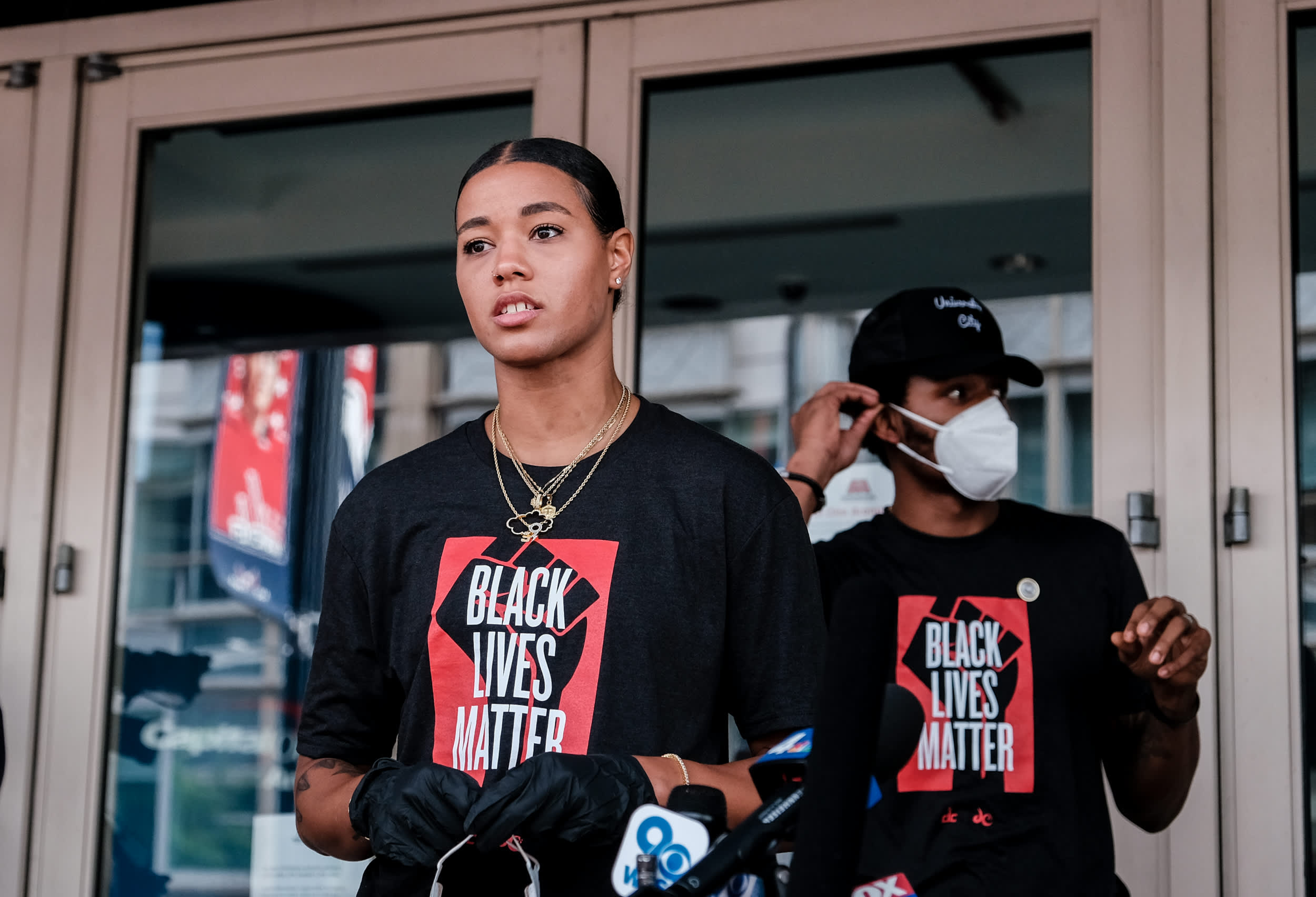
When the WNBA announced the start of its 2020 season last July, more than a dozen players opted out of participating. While concerns about health and safety amid the coronavirus pandemic led some athletes to sit out, others grappled with how to balance the demands of a new season while still fighting for racial justice and equality.
One of those players was Washington Mystics star Natasha Cloud who decided to skip last year’s season in order to focus on social justice reform. Though Cloud had long used her platform to raise awareness about important community issues, including speaking out against gun violence in the D.C. community in 2019, the 29-year-old says she felt like the deaths of George Floyd and Breonna Taylor called for another level of activism that required her to take a break from the game.
“For me personally, I knew I wouldn’t be able to be 100% on the court because of where my heart was at,” she tells CNBC Make It. “My heart was with social reform and being on the front lines with my community.”
Like Cloud, several of her WNBA peers, including those who played last season in the “wubble,” are leading the charge in speaking out on social justice issues. Throughout the season, players across the league wore special uniforms that displayed Breonna Taylor’s name in an effort to bring awareness to the death of the 26-year-old Black medical worker who was fatally shot in her home by Louisville police officers in March 2020. Additionally, during warm-ups, players wore shirts that displayed “Black Lives Matter” on the front and “Say Her Name” on the back, in order to bring awareness to the Say Her Name social campaign that highlights ongoing acts of police brutality and racial violence against Black women and girls.
And, as anti-Asian violence continues to be on the rise, many WNBA players and organizations have used their platforms to speak out in support of the Asian American and Pacific Islander (AAPI) community.
Now, as the league gears up for its 25th season, WNBA Commissioner Cathy Engelbert says they will continue to focus on raising awareness around important community issues through the Social Justice Council that several players in the league started last year.
“Our social justice efforts, we’re not one-and-done,” Engelbert told The Washington Post.
The mission of the council, according to the league’s website, is to create space for ongoing conversations about race, voting rights, LGBTQ+ advocacy, gun reform and other important social issues. Advisers to the council include prominent activists and leaders like Black Lives Matter co-founder Alicia Garza, Rock the Vote CEO Carolyn DeWitt and Black Girls Rock founder and CEO Beverly Bond.
“There are obviously many issues that we focus on, but at the root of everything we do we are fighting for equality and justice for all women no matter the race, religion, orientation, etc.,” says Breanna Stewart, MVP of the 2020 championship-winning Seattle Storm and a leader on the council. “We want to continue to use our platforms as more than just basketball players but as those who have a tremendous impact and reach to our respective communities.”
As a Black, non-binary player in the league, New York Liberty Star Layshia Clarendon says using the WNBA’s platform to speak up about social justice issues is super important.
“I don’t think there’s a way for me individually to stay out of politics or to stay out of social justice because my existence is really political and the country we live in has made it political,” Clarendon, who also leads the Social Justice Council, says. “I really just want to be the representation that I did not have when I was younger. I didn’t see a non-binary person playing in the WNBA that had top surgery and could just live so fully and free and beautifully in their whole existence…And, I really just want to leave this league better than I found it.”
Layshia Clarendon #7 of the New York Liberty smiles before the game against the Atlanta Dream on September 3, 2020 at Feld Entertainment Center in Palmetto, Florida.
Stephen Gosling | National Basketball Association | Getty Images
Cloud, who used her time away last season to organize peaceful marches in Washington, D.C. and her hometown of Pennsylvania over the summer, says she’s proud of what her WNBA peers accomplished while playing in the league.
In Atlanta, not only did players on the Atlanta Dream team push back against owner and former Georgia Senator Kelly Loeffler who spoke out against the Black Lives Matter movement, but they also played a critical role in encouraging people to vote in the 2020 Georgia Senate runoff election, which Loeffler lost to Democrat opponent Raphael G. Warnock.
In February, after months of tension with players on the team, Loeffler sold her stake in the Atlanta Dream to a three-person investor group that included former Dream player Renee Montgomery, making Montgomery the first former WNBA player to become an owner and executive in the league.
“Renee is just paving the way for all of us,” says Cloud, who plans to return to the Mystics for the 2021 season. “She’s breaking down the barriers that have been put in place for women, and for Black women especially, so it’s just phenomenal to see.”
When looking at the WNBA’s impact over the past year, including its social justice work and groundbreaking collective bargaining agreement that granted players more money and benefits, Phoenix Mercury star Skylar Diggins says she hopes other women inside and outside the league will be inspired to speak up for change regardless of the critics who tell them to “stick to sports” or “shut up and dribble.”
“Never, never, never just ‘shut up and work, or dribble, etc.,'” she says.
Check out: Use this calculator to see exactly how much your third coronavirus stimulus check could be worth
Don’t miss: How USWNT star Alex Morgan and other women Olympians are fighting for equal coverage in sports media




